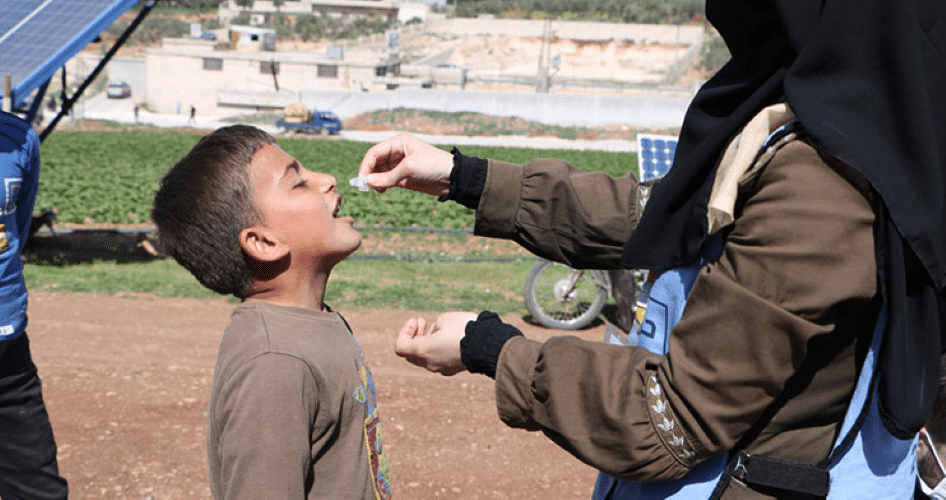Marking 50 years of EPI’s life-saving impact

22 July 2024 – An event to mark the 50th anniversary of the Essential Programme on Immunization (EPI) was hosted by the WHO Regional Office for the Eastern Mediterranean on the evening of 17 July 2024, in Cairo, Egypt.
EPI is a cornerstone of global public health since it came into being in 1974, originally as the Expanded Programme on Immunization. Over the decades, the WHO initiative has saved countless lives and protected millions of children from preventable diseases – earning it the new title of “Essential”*.
A wide range of high-level participants were invited to celebrate the momentous occasion. National managers, advisers and representatives of national immunization programmes from across the Region joined members of United Nations agencies, partner organizations and donors at the event.
In her opening remarks to guests, given on her behalf by Dr Rana Hajjeh, Director of Programme Management, WHO Regional Office for the Eastern Mediterranean, WHO Regional Director for the Eastern Mediterranean region Dr Hanan Balkhy described EPI as “a great example of what can be achieved to safeguard the health of our communities when we all work together.” She urged continued support from all stakeholders to enhance immunization efforts across the Region to close gaps and at last, achieve regional and global EPI targets.
This call to action aligns with the Regional Director’s new regional flagship initiatives and vision to accelerate action, expand access and ensure equity in health.
At the event, WHO launched a polio transition investment case that aims to support investments in polio assets beyond polio eradication. In this way, the assets can continue to support routine immunization, surveillance and outbreak response for other diseases affecting the Region.
Recognizing immunization successes
The event was also a chance to recognize country-level achievements in immunization over the past 50 years. Afghanistan, the occupied Palestinian territories, Somalia, Sudan, Syria and Yemen received awards commending their continuation of immunization services even amid active conflict and other emergency situations.
Djibouti, which is also experiencing many challenges, was recognized for its commitment and endeavours to improve the national immunization programme.
Iraq and Libya were given awards as the first 2 countries of the Region to complete the polio transition process. Egypt, Bahrain, the Islamic Republic of Iran and Oman were each recognized for eliminating both measles and rubella.
Nine countries were celebrated for steps taken to introduce new vaccines: Bahrain, Kuwait, Morocco, Qatar, Saudi Arabia and United Arab Emirates, for introduction of human papillomavirus (HPV) vaccine; Pakistan, for reducing the number of zero-dose children and for the decision to introduce HPV vaccine; Tunisia, for the decision to introduce HPV vaccine; Lebanon, for introducing pneumococcal and rotavirus vaccine despite serious economic constraint and Jordan, for the decision to introduce pneumococcal conjugate vaccine.
Special recognition was given to the United Nations Relief and Works Agency for Palestine Refugees in the Near East (UNRWA) for its continuation of immunization services in the Gaza Strip during the active war.
Many individuals and stakeholders have helped to make EPI a success and their dedication was also recognized on the evening. National EPI managers, immunization advisers, health workers, members of partner organizations and government representatives took home awards.
“Together, committed for continued immunization”, pledged stakeholders at the event – whether in person or via recorded message. The pledge reflects the determination to maintain the success and impact of EPI, continuing the journey that began 50 years ago.
* GAVI, The Vaccine Alliance (GAVI), was set up as a Global Health Partnership in 2000 with the goal of creating equal access to new and underused vaccines for children living in the world’s poorest countries. In particular, GAVI aims at accelerating access to vaccines, strengthening countries’ health and immunization systems, and introducing innovative new immunization technology. Since GAVI’s inception, it has subsequently supported the immunization of an additional 326 million children and prevented a potential 5.5 million deaths.
Observer Voice is the one stop site for National, International news, Sports, Editor’s Choice, Art/culture contents, Quotes and much more. We also cover historical contents. Historical contents includes World History, Indian History, and what happened today. The website also covers Entertainment across the India and World.

